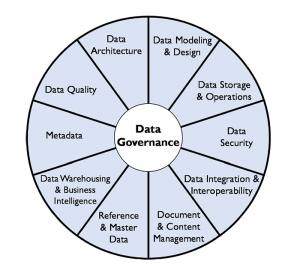Explainer: Data governance vs data management
Professional jargon is a real double-edged sword. It’s intended to let members of the same industry speak specifically and without confusion… but when there are many similar phrases, and unique workplace “dialects”, sometimes it does the complete opposite.
Because these essential components allow your organisation to extract the maximum value from your data, it’s important to know how to navigate them with certainty. That’s why we’ve created this explainer – to help discern the difference and understand the role they each play in your organisation.
What is data management?
Data management describes all of the activities that give data its value. We all know that data is one of – if not the most – valuable assets in a modern business. But realistically, data without context is of little use. We need to manage our data to ensure it is usable and understood – i.e., it needs to be consistent and accurate, clean, accessible, secured, analysed and modelled.
According to DAMA International, data management incorporates:
- Data governance
- Data modelling and design
- Data storage and operations
- Data security
- Data integration and interoperability
- Document and content management
- Reference and master data
- Data warehousing and business intelligence
- Metadata
- Data quality
- Data architecture
What is data governance?
Data governance describes the policies that allow you to manage your data. It’s the processes that uphold the overall data management efforts. According to a McKinsey study, working with mis-governed data (poor quality and/or availability) means 30% of employees’ time is spent on non-value-added tasks, so governance is not only a quality concern, but also a productivity one.
Best practice data governance should provide consistency of terminology across data assets, ensure that data is classified and handled appropriately, provide forums for decision making across business units and technology teams, and ensure that staff are trained and well informed regarding correct data practices.
It allows your organisation to use your data collectively (i.e. not in inconsistent departmental silos), with full compliance to data privacy laws and regulations, and (through consistently named data assets containing quality standardised data) enables more robust analytics and reporting.
According to the Data Governance Institute, while organisations will have their own specific data governance aims, they should all strive for these seven universal goals:
- Enable better decision-making
- Reduce operational friction
- Protect the news of data stakeholders
- Train management and staff to adopt common approaches to data
- Build standard, repeatable processes
- Reduce costs and increase effectiveness
- Ensure transparency of processes.
Why do people think data management and data governance are interchangeable?
Aside from the general similarities between “management” and “governance”, one of the main reasons these phrases are mistakenly interchanged is because of a misinterpretation of the definition in DAMA International’s Data Management Book of Knowledge (DMBoK), a resource that defines data management standards and practices.
DMBoK Wheel, via Dataversity
In this resource, there is a diagram that depicts each data management discipline, laid out as a wheel (indeed, it’s usually referred to as the DMBoK Wheel or the DAMA Wheel) – with “data governance” at the centre. It’s placed in the centre because data governance does affect all other disciplines; the ten other components need policies and standards to allow them to function to their greatest potential.
However, these factors make it easy to (incorrectly) believe they are freely interchangeable terms.
Get expert advice from 9Yards consultants
9Yards’ data architecture and data governance consultants are on hand to assess your current data governance and management capabilities and develop actionable outcomes to uplift your organisation’s approach to collecting, storing, transforming, distributing and using data. If you’re ready to derive more value than ever from your data, please get in touch to arrange a consultation today.


